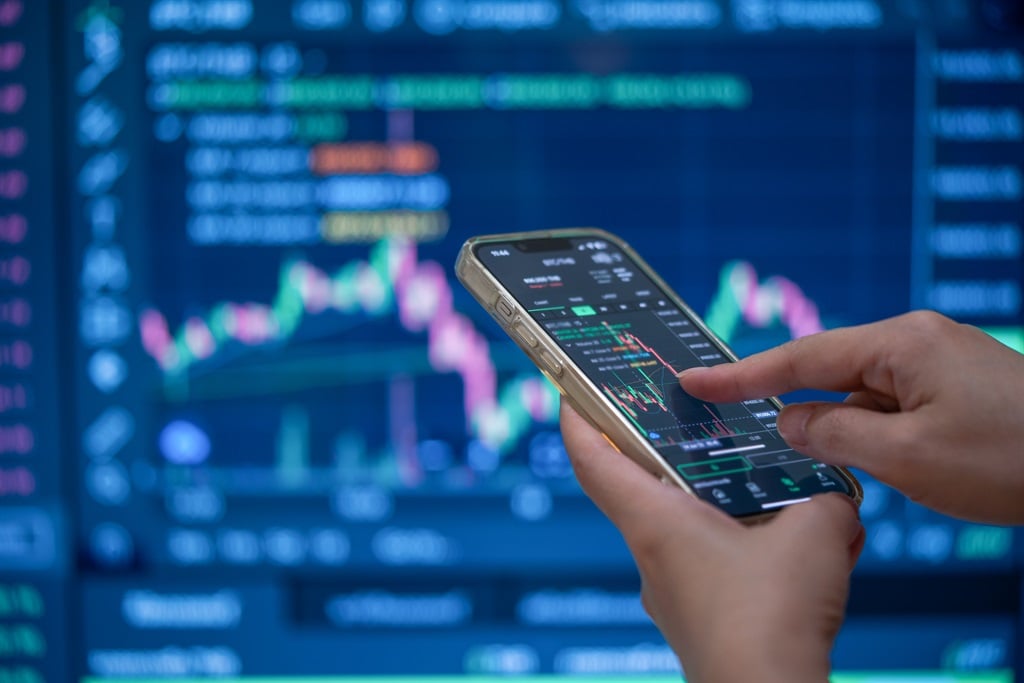
Equity markets have been in free fall since Trump’s announcement Wednesday unveiling sweeping tariffs on trading partners that were far more impactful than markets expected. (Photo: Manusapon Kasosod/Getty Images)
Trading floors across the globe were overcome by waves of further selling after last week’s sharp losses, with US President Donald Trump telling Americans to “be strong, courageous, and patient,” minutes before the New York stock market opened to drops of over three percent.
“The United States has a chance to do something that should have been done DECADES AGO,” Trump said in reference to his tariff reforms that have upended the global economy.
“Don’t be Weak! Don’t be Stupid!… Be Strong, Courageous, and Patient, and GREATNESS will be the result!”
About 20 minutes into trading, the Dow Jones Industrial Average was down 3.6 percent at 36,947.62.
The broad-based S&P 500 tumbled 3.5 percent to 4 897.96, while the tech-rich Nasdaq Composite Index shed 3.7 percent to 15,017.24.
Equity markets have been in free fall since Trump’s announcement Wednesday unveiling sweeping tariffs on trading partners that were far more impactful than markets expected.
The losses pushed Nasdaq into a bear market last week with the other two indices not far behind. A bear market is defined as a 20 percent drop from a recent peak.
“In the short term we are very very very oversold and we’re overdue to bounce,” said Adam Sarhan of 50 Park Investments. “In the event that we can’t bounce, that tells us we’re probably going lower.”
Economists point to a rising risk of recession in light of a possible resurgence in inflation and a slowdown in capital investment from businesses unsettled by shifting US policies.
“Whether or not the menu of tariffs causes a recession remains in question, but it will slow down growth,” JPMorgan Chase Chief Executive Jamie Dimon said in a letter to investors, concluding that “the recent tariffs will likely increase inflation.”
Trillions of dollars have been wiped off combined stock market valuations in recent sessions.
Hong Kong collapsed by 13.2 percent in its worst day in nearly three decades.
Taipei stocks suffered their worst fall on record Monday, tanking 9.7 percent, while Tokyo closed down by almost eight percent.
Frankfurt fell as much as 10 percent in early trading before paring back losses to trade around 4.6 percent lower in afternoon deals.
Bitcoin tumbled while the dollar was mixed after sharp losses last week.
“The carnage in global equity markets has continued,” said Thomas Mathews, Asia Pacific head of markets at Capital Economics.
He said Trump could still pare back his tariffs.
“But, if he doesn’t, equities could get a lot sicker yet.”
A 10-percent “baseline” tariff on imports from around the world took effect Saturday.
A slew of countries will be hit by higher duties from Wednesday, with levies of 34 percent for Chinese goods and 20 percent for EU products.
Beijing announced last week its own 34-percent tariff on US goods, which will come into effect on Thursday.
Canada on Monday launched a WTO complaint against US auto tariffs.
The EU said it had made an offer to the United States for the two sides to have zero tariffs on cars and other industrial goods, while Tokyo agreed to more talks with Washington.
Bitter medicine
Hopes that the US president would rethink his policy in light of the turmoil were dashed Sunday when he said he would not make a deal with other countries unless trade deficits were solved.
“Sometimes you have to take medicine to fix something,” he said of the ructions that have wiped trillions of dollars off company valuations, which impacts the retirement savings of a large number of Americans.
In a letter to shareholders, JPMorgan Chase CEO Jamie Dimon warned that Trump’s broad tariffs “will likely increase inflation”.
“Whether or not the menu of tariffs causes a recession remains in question, but it will slow down growth,” Dimon said, concluding that “the recent tariffs will likely increase inflation.”
With the start of the first quarter earnings reports, the market is likely to get a flurry of updated outlooks by companies that could further dampen sentiment.
Monday’s savage selling was across the board, with no sector spared.
Tech firms, carmakers, banks, casinos and energy firms all felt the pain as investors abandoned riskier assets.
Concerns about future energy demand saw oil prices sink as much as three percent, having dropped some seven percent Friday.
Both main contracts hit their lowest levels since 2021.
The Kremlin said it was monitoring the plummeting price of oil – on which Russia’s economy is highly dependent.


